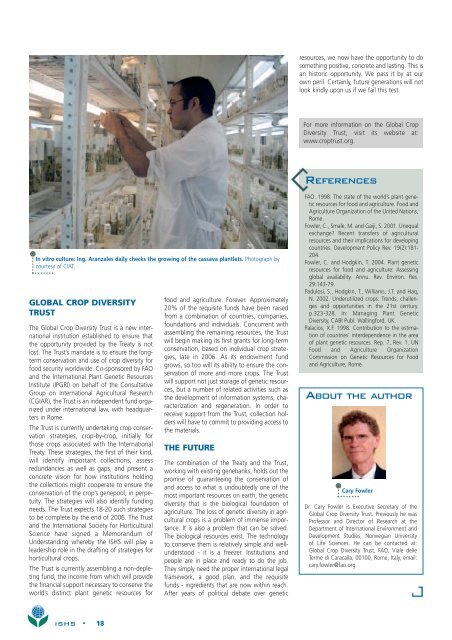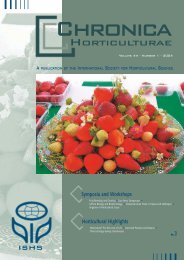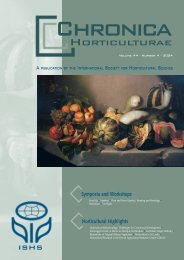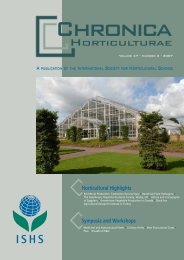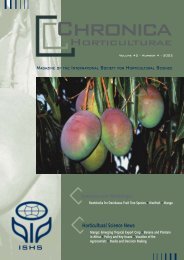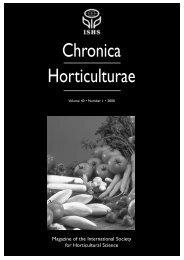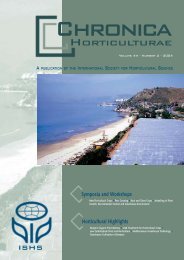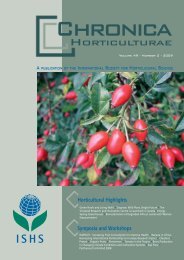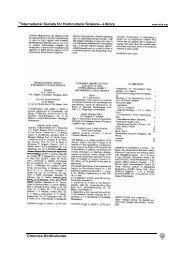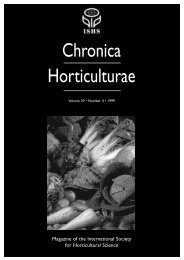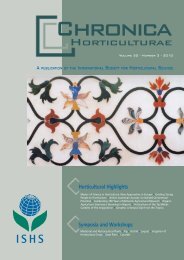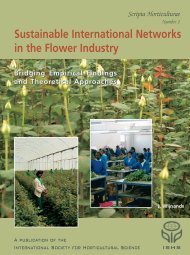Acta Horticulturae
Acta Horticulturae
Acta Horticulturae
Create successful ePaper yourself
Turn your PDF publications into a flip-book with our unique Google optimized e-Paper software.
esources, we now have the opportunity to do<br />
something positive, concrete and lasting. This is<br />
an historic opportunity. We pass it by at our<br />
own peril. Certainly, future generations will not<br />
look kindly upon us if we fail this test.<br />
For more information on the Global Crop<br />
Diversity Trust, visit its website at:<br />
www.croptrust.org.<br />
REFERENCES<br />
In vitro culture: Ing. Aranzales daily checks the growing of the cassava plantlets. Photograph by<br />
courtesy of CIAT.<br />
GLOBAL CROP DIVERSITY<br />
TRUST<br />
The Global Crop Diversity Trust is a new international<br />
institution established to ensure that<br />
the opportunity provided by the Treaty is not<br />
lost. The Trust’s mandate is to ensure the longterm<br />
conservation and use of crop diversity for<br />
food security worldwide. Co-sponsored by FAO<br />
and the International Plant Genetic Resources<br />
Institute (IPGRI) on behalf of the Consultative<br />
Group on International Agricultural Research<br />
(CGIAR), the Trust is an independent fund organized<br />
under international law, with headquarters<br />
in Rome.<br />
The Trust is currently undertaking crop conservation<br />
strategies, crop-by-crop, initially for<br />
those crops associated with the International<br />
Treaty. These strategies, the first of their kind,<br />
will identify important collections, assess<br />
redundancies as well as gaps, and present a<br />
concrete vision for how institutions holding<br />
the collections might cooperate to ensure the<br />
conservation of the crop’s genepool, in perpetuity.<br />
The strategies will also identify funding<br />
needs. The Trust expects 18-20 such strategies<br />
to be complete by the end of 2006. The Trust<br />
and the International Society for Horticultural<br />
Science have signed a Memorandum of<br />
Understanding whereby the ISHS will play a<br />
leadership role in the drafting of strategies for<br />
horticultural crops.<br />
The Trust is currently assembling a non-depleting<br />
fund, the income from which will provide<br />
the financial support necessary to conserve the<br />
world’s distinct plant genetic resources for<br />
food and agriculture. Forever. Approximately<br />
20% of the requisite funds have been raised<br />
from a combination of countries, companies,<br />
foundations and individuals. Concurrent with<br />
assembling the remaining resources, the Trust<br />
will begin making its first grants for long-term<br />
conservation, based on individual crop strategies,<br />
late in 2006. As its endowment fund<br />
grows, so too will its ability to ensure the conservation<br />
of more and more crops. The Trust<br />
will support not just storage of genetic resources,<br />
but a number of related activities such as<br />
the development of information systems, characterization<br />
and regeneration. In order to<br />
receive support from the Trust, collection holders<br />
will have to commit to providing access to<br />
the materials.<br />
THE FUTURE<br />
The combination of the Treaty and the Trust,<br />
working with existing genebanks, holds out the<br />
promise of guaranteeing the conservation of<br />
and access to what is undoubtedly one of the<br />
most important resources on earth, the genetic<br />
diversity that is the biological foundation of<br />
agriculture. The loss of genetic diversity in agricultural<br />
crops is a problem of immense importance.<br />
It is also a problem that can be solved.<br />
The biological resources exist. The technology<br />
to conserve them is relatively simple and wellunderstood<br />
- it is a freezer. Institutions and<br />
people are in place and ready to do the job.<br />
They simply need the proper international legal<br />
framework, a good plan, and the requisite<br />
funds - ingredients that are now within reach.<br />
After years of political debate over genetic<br />
FAO. 1998. The state of the world’s plant genetic<br />
resources for food and agriculture. Food and<br />
Agriculture Organization of the United Nations,<br />
Rome.<br />
Fowler, C., Smale, M. and Gaiji, S. 2001. Unequal<br />
exchange? Recent transfers of agricultural<br />
resources and their implications for developing<br />
countries. Development Policy Rev. 19(2):181-<br />
204.<br />
Fowler, C. and Hodgkin, T. 2004. Plant genetic<br />
resources for food and agriculture: Assessing<br />
global availability. Annu. Rev. Environ. Res.<br />
29:143-79.<br />
Padulosi, S., Hodgkin, T., Williams, J.T. and Haq,<br />
N. 2002. Underutilized crops: Trends, challenges<br />
and opportunities in the 21st century.<br />
p.323-328. In: Managing Plant Genetic<br />
Diversity, CABI Publ. Wallingford, UK.<br />
Palacios, X.F. 1998. Contribution to the estimation<br />
of countries’ interdependence in the area<br />
of plant genetic resources. Rep. 7, Rev. 1. UN<br />
Food and Agriculture Organization<br />
Commission on Genetic Resources for Food<br />
and Agriculture, Rome.<br />
ABOUT THE AUTHOR<br />
Cary Fowler<br />
Dr. Cary Fowler is Executive Secretary of the<br />
Global Crop Diversity Trust. Previously he was<br />
Professor and Director of Research at the<br />
Department of International Environment and<br />
Development Studies, Norwegian University<br />
of Life Sciences. He can be contacted at:<br />
Global Crop Diversity Trust, FAO, Viale delle<br />
Terme di Caracalla, 00100, Rome, Italy, email:<br />
cary.fowler@fao.org<br />
ISHS • 18


